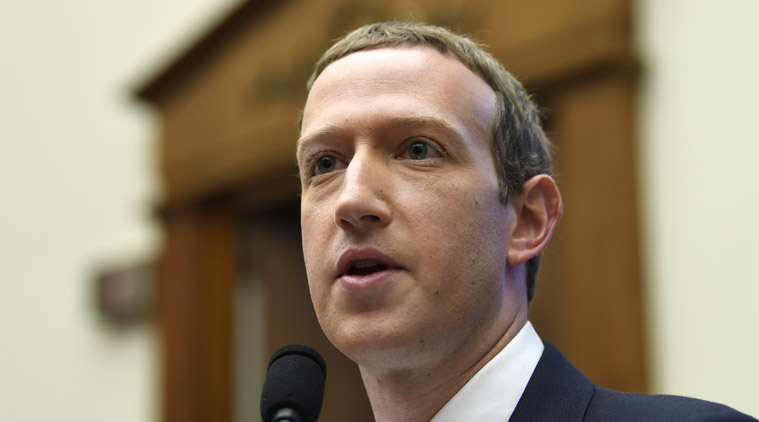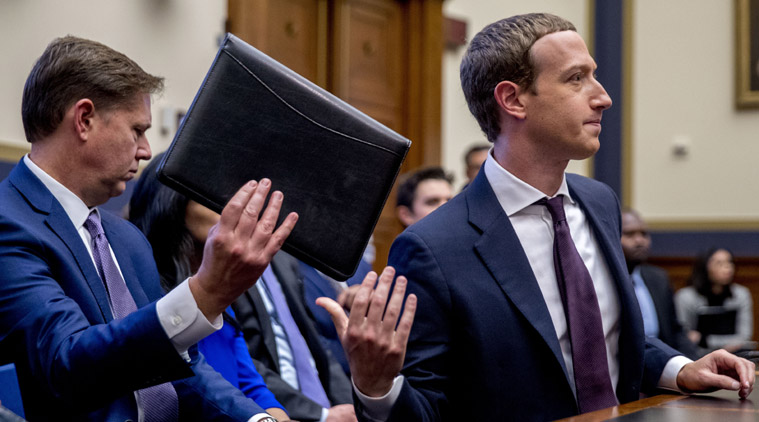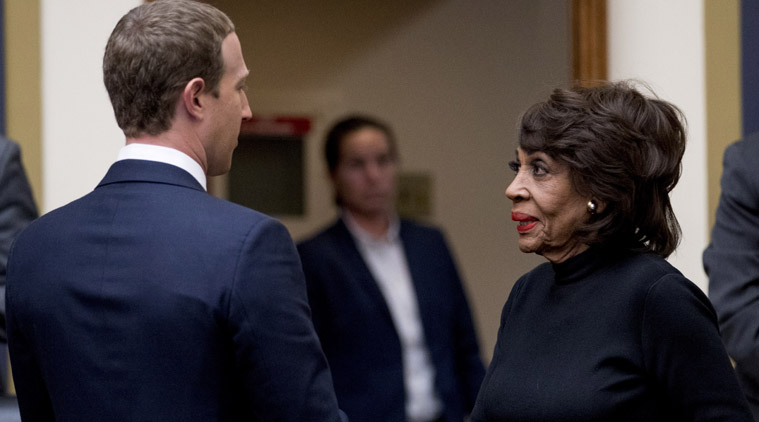Facebook’s big Libra hearing: What we learnt from Mark Zuckerberg’s testimony
Facebook CEO Mark Zuckerberg has testified in front of the US House Financial Services Committee over the company's digital currency project called Libra. Here are the important points that stood out in his testimony.
 Facebook Chief Executive Officer Mark Zuckerberg testifies before the House Financial Services Committee on Capitol Hill in Washington, Wednesday, October 23, 2019, to discuss his plans for the new cryptocurrency Libra. (Image source: AP)
Facebook Chief Executive Officer Mark Zuckerberg testifies before the House Financial Services Committee on Capitol Hill in Washington, Wednesday, October 23, 2019, to discuss his plans for the new cryptocurrency Libra. (Image source: AP)
Facebook CEO Mark Zuckerberg testified before the US House Financial Services Committee on Wednesday over the company’s digital currency project called Libra. Zuckerberg who answered questions for nearly six hours, faced questions that ranged from Libra’s location and the purpose behind it, to political ads and misinformation on the platform.
For Zuckerberg, the hearing was an important opportunity to convince lawmakers about the merits of Libra, and to assure them that Facebook would not move forward until it had the necessary regulatory approval from the US government.
But US lawmakers made it clear they are still skeptical of Facebook’s ambitious cryptocurrency plans, especially going by the company’s past record on user privacy and handing of user data. Patrick McHenry, the ranking member of the House Financial Services Committee, said in the concluding remarks that Zuckerberg had failed to give a deeper understanding of how Libra will work or how it might further financial inclusion, or the question of cross-border movement of value and money.
Read more: Mark Zuckerberg tries to convince skeptical Congress on Libra, privacy
Further he said, it was not clear how Libra will provide access to financial services for Americans who need it the most. “We don’t have clarity about that,” he said.
Here are the important points that were highlighted during Zuckerberg’s Libra testimony.
 Facebook CEO Mark Zuckerberg, right, hands a folder to Facebook vice president for US public policy, Kevin Martin, left, at the end of a House Financial Services Committee hearing on Capitol Hill in Washington, Wednesday, October 23, 2019, on Facebook’s impact on the financial services and housing sectors. (Image source: AP)
Facebook CEO Mark Zuckerberg, right, hands a folder to Facebook vice president for US public policy, Kevin Martin, left, at the end of a House Financial Services Committee hearing on Capitol Hill in Washington, Wednesday, October 23, 2019, on Facebook’s impact on the financial services and housing sectors. (Image source: AP)
Why Libra at all
McHenry asked Zuckerberg why the company was creating something like Libra in the first place, and whether it was to compete with global peers like AliPay or WeChat, which already have huge payments systems in China. Zuckerberg said it was “partially that.” He went on to add that it was “partially” because he views the financial infrastructure in the United States as outdated.
“There’s another set of work, which is what we’re trying to do with Libra. Which is trying to rethink what a modern infrastructure for the financial would be if you started it today rather than 50 years ago on a lot of outdated systems,” Zuckerberg replied.
Read more: In Libra hearing, Zuckerberg will admit that Facebook faces trust issues
Why Switzerland is the base for Libra organisation
Zuckerberg was also asked why Facebook chosen Switzerland for Libra, and not the United States. At first he said, Switzerland is where a lot of the international organisations are, and Libra is a global system, which will be independent.
When asked whether it was because there was greater regulatory certainty in Switzerland than in the US for this kind of technology, Zuckerberg replied that Switzerland had “certainly been forward leaning on wanting to work through systems like this,” but added that Facebook would not launch anything that’s a product or a part of this until they get have full support from US regulators.
 Chairwoman Rep. Maxine Waters, D-Calif, right, speaks with Facebook CEO Mark Zuckerberg after he testifies before a House Financial Services Committee hearing on Capitol Hill in Washington, Wednesday, October 23, 2019, on Facebook’s impact on the financial services and housing sectors. ( Image source: AP Photo)
Chairwoman Rep. Maxine Waters, D-Calif, right, speaks with Facebook CEO Mark Zuckerberg after he testifies before a House Financial Services Committee hearing on Capitol Hill in Washington, Wednesday, October 23, 2019, on Facebook’s impact on the financial services and housing sectors. ( Image source: AP Photo)
The China argument
Zuckerberg also tried to argue that the US was holding back on innovation in the financial system, especially cryptocurrency, and that rival China was marching ahead.
In his opening remarks, he said, “While we debate these issues, the rest of the world isn’t waiting. China is moving quickly to launch similar ideas in the coming months. Libra will be backed mostly by dollars and I believe it will extend America’s financial leadership as well as our democratic values and oversight around the world. If America doesn’t innovate, our financial leadership is not guaranteed.”
Libra and approval from US regulators
Zuckerberg tried to assure lawmakers that Facebook would not do something without the approval of US regulators. He said that unlike other cryptocurrency projects, some which are completely decentralized and deregulated, Facebook wants to “build a safe and secure and regulated alternative.”
He also tried to allay concerns on money-laundering saying, “We’re going to work with the government to build something that gets to the same standard on anti-money laundering and that all of the other world class payment systems have or exceed those standards.”
Fact-checking on Political ads
Zuckerberg was also questioned on political ads and Facebook’s fact-checking process by chair of the committee Maxine Waters, as well as member Alexandria Ocasio-Cortez. Waters asked Zuckerberg if Facebook was planning to do no fact-checking of political ads, to which he replied, “We do not fact check politicians’ speech and the reason for that is that we believe in a democracy it is important that people can see for themselves what politicians are saying.”
When asked what they do for fact-checking ads, Zuckerberg said Facebook itself does not check them, but has independent fact-checking partners, who are contracted for this.
Ocasio-Cortez, meanwhile, asked whether Facebook would allow politicians to pay to spread misinformation in the 2020 elections, and wanted to know how far she could push this. When asked whether she could target zip codes with predominately black voters to advertise wrong election dates, Zuckerberg said that such an ad would not be allowed because it can cause harm or suppress voters.
But when Ocasio-Cortez asked if she could create ads that lied to Republican supporters and stated that Republicans supported the Green New Deal legislation, Zuckerberg responded that he did not know if the ad would be allowed or not, indicating it would probably be allowed.
Read more: Despite defections, Facebook officially launches Libra
On why some Libra partners had dropped out
Zuckerberg admitted it was a risky project and there has been a lot of scrutiny, which could explain why some partners had left. Partners like Visa, PayPal, ebay etc have quit the Libra organisation. There are now just 21 partners left from the original 28.







